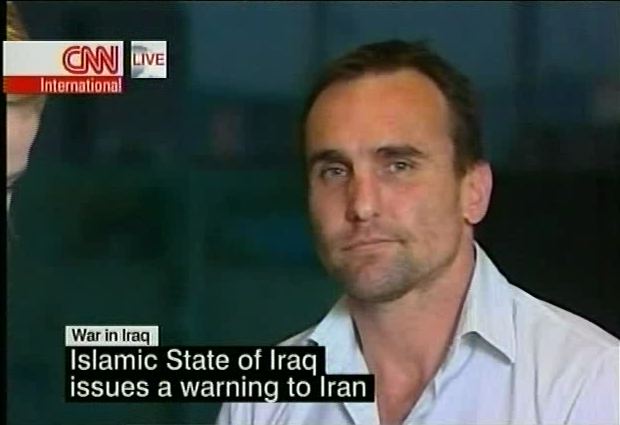YWT: "There's already a militia war."

Click photo to play
Length: 5:20
JIM CLANCY: Calls for a troop pullout from Iraq growing louder in the U.S. among lawmakers, but in Iraq, many officials say that would be a disaster. Iraq's foreign minister warning an early U.S. troop withdrawal could plunge Iraq into all-out civil war. Hoshiyar Zebari says such a move could trigger the country's complete collapse.
HALA GORANI: Well, Jim, the conflict is facing some key benchmarks in the coming weeks and months. The Bush war policy takes center stage on the floor of the U.S. Senate, of course, this week, as lawmakers begin a contentious debate on a major defense spending bill; the list of Republicans calling for a change in Iraq continuing to grow, as well.
Back in May, the U.S. Congress demanded that the Iraqi government show progress on specific benchmarks. An interim report is due on July 15th, so really just a few days away. A more specific report by the top U.S. commander in Iraq is set for mid to late September, but "The New York Times" is reporting that there's been an internal debate inside of the White House itself about whether the president should announce a troop pullback sooner rather than later.
Well, joining us now for more on all the developments in Iraq and Iran's influence inside this country is our own Michael Ware here in Baghdad.
So, Michael, let's first start with these reports that the Iraqi Shiite Cleric Muqtada al-Sadr may be in Iran right now. Is that even significant?
MICHAEL WARE, CNN INT'L. CORRESPONDENT: Well, certainly our sources within the Mahdi Army had indeed warned us that Muqtada al-Sadr would be going to Iran. Now, they were citing the reason for that was concern within the senior ranks of his organization at the arrest of a man called Qais Khazali.
Now, he was detained by U.S. forces in connection to the attempted kidnap of five U.S. soldiers and he's been talking. And we're told that that's what Muqtada's worried about. Now in Iran, we saw him go there earlier this year. He was able to maintain control, by remote. So the fact that he's not present really doesn't dilute his influence, but it does show that, obviously, he's under some kind of pressure.
GORANI: Now, let's talk about the Islamic State of Iraq, this self-proclaimed group here in Iraq, giving Shiite forces two months to stop attacks against their fighters or else. What does this mean?
WARE: Well, what they're saying is they're warning Iran specifically. They're saying, "we're giving you two months to stop supporting the Shia government and to stop attacking the Islamic State of Iraq." Now, the Islamic State of Iraq is al Qaeda in Iraq. Now, unlike the old-school al Qaeda of Osama bin Laden, this is the progeny of the late leader of al Qaeda, Abu Musab al-Zarqawi. Now, he made it very clear his grand design from day one was to go and pick a war with the Shia.
Now, that means Iran as well. He believed that only by doing that will the great Sunni nation stand up and awake and strike back. So this is not new. This is an evolution of their thinking, their strategy.
GORANI: What would be the reaction on the other side, any worry at all?
WARE: I would imagine it would be hard for Iran to actually be worried about a threat from the Islamic State of Iraq. I mean, their attacks continue every day already. They're striking directly at this Iranian-backed government here in Iraq, and they're attacking Shia civilians day by day. They're unable to launch an offensive against Iran itself, so the war will remain here where it has from the beginning.
GORANI: What do you make of the Sunni vice president's statement that ordinary citizens in Iraq should just arm themselves of the security vacuum? What does that mean? How should we read it?
WARE: Well, we already know that every household in this country is allowed to have one AK-47 assault rifle. So they're already armed. We already know that in neighborhoods, men have to take to the streets every night to protect their block against death squads, against al Qaeda, against Sunni insurgents, and even against American raids. So the concept isn't new.
And indeed, we've seen America adopt this. They have coalesced the Baathist insurgency, contracting out, essentially, the fight against al Qaeda in parts of the country because the Baathists know where al Qaeda is and America doesn't, and they don't have the rules of war that America does. They can just walk in and kill these men, so that's what Tariq al-Hashimi is referring to.
GORANI: But when you look at the global picture and look at other countries that have gone through the same thing, where ordinary citizens group together and arm themselves to protect their own group, does that mean a militia war when the Americans leave?
WAR: Absolutely. We already have one now. What do we have to wait for the Americans to leave for? There's already a militia war. And speaking to hard-line Iranian-backed elements of this government, Shia factions, they're saying to me that these are America's Sunni militia. And effectively what they told me over the weekend is that this is America's insurance policy against us, the Iraqi government.
GORANI: All right, Michael Ware, as always, thanks so much.
Well, for all of you following the Iraq story and all of our other headlines, you can always check out the website, CNN.com/International.
That's it for now from us, back to you, Jim.
CLANCY: All right, Hala, thank you very much for that.
